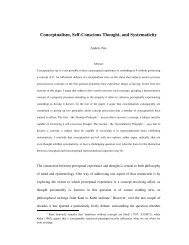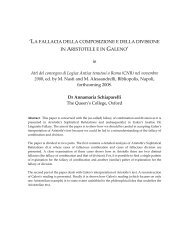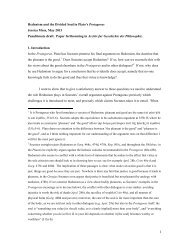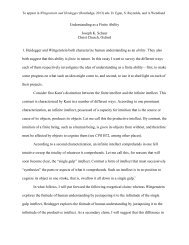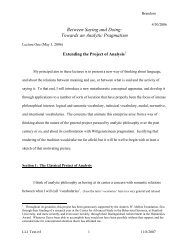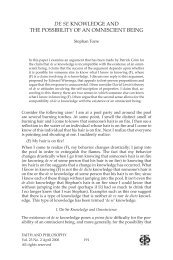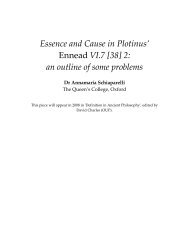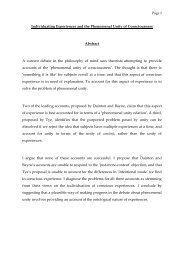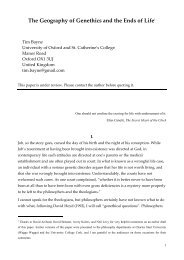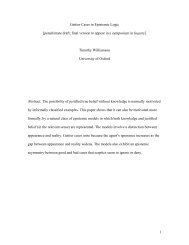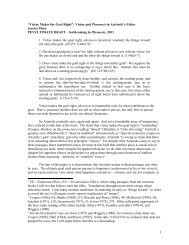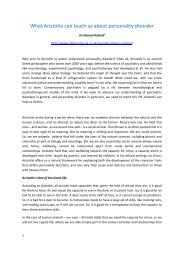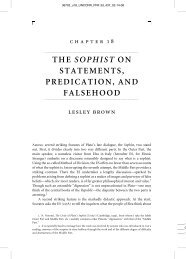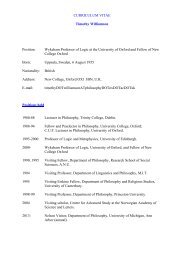Say who everyone is as you go along - Faculty of Philosophy ...
Say who everyone is as you go along - Faculty of Philosophy ...
Say who everyone is as you go along - Faculty of Philosophy ...
Create successful ePaper yourself
Turn your PDF publications into a flip-book with our unique Google optimized e-Paper software.
40<br />
'I do not mean <strong>as</strong> a deception, an "appearance", an "idea" (in the Berkeleyan and<br />
Schopenhaueran sense), but <strong>as</strong> possessing the same degree <strong>of</strong> reality <strong>as</strong> our emotions<br />
themselves' (BGE para 36 p. 66)<br />
Ideal<strong>is</strong>m <strong>is</strong> the attempt to reduce the external world to the internal world, to reduce<br />
the physical to the mental, the objective to the subjective. Ideal<strong>is</strong>ts typically w<strong>is</strong>h to<br />
translate claims about material reality into claims about non-material appearance.<br />
Nietzsche <strong>is</strong> not attempting any such reduction. Indeed, he <strong>is</strong> trying to do prec<strong>is</strong>ely<br />
the opposite. It <strong>is</strong> the fact that the external world cannot be logically reduced to our<br />
imaginary projections that makes the latter erroneous or imaginary. The external<br />
world <strong>is</strong> not the imaginary world.<br />
Nietzsche thinks the content <strong>of</strong> our fictional world h<strong>as</strong> <strong>as</strong> much reality <strong>as</strong> our<br />
emotions. Both are psychological. Both are felt or under<strong>go</strong>ne. Both matter to us. We<br />
spend a great deal <strong>of</strong> mental time in both. Both are non-physical. Neither <strong>is</strong> part <strong>of</strong><br />
the external world. Neither <strong>is</strong> either true <strong>of</strong> the external world: not our thought-world<br />
because it <strong>is</strong> erroneous, not our emotions because they are not the sorts <strong>of</strong> things that<br />
could be true or false.<br />
Eating the Menu<br />
Crucially, the Buddh<strong>is</strong>t doctrine <strong>is</strong> no more ideal<strong>is</strong>t than Nietzsche. There <strong>is</strong> no<br />
doubt about th<strong>is</strong>. Alan Watts warns from the outset that any ideal<strong>is</strong>t reading wil be<br />
m<strong>is</strong>taken:<br />
'Maya [...] in trying to gr<strong>as</strong>p its meaning one must try to put <strong>as</strong>ide the various<br />
"ideal<strong>is</strong>t" philosophies <strong>of</strong> the West with which it <strong>is</strong> <strong>of</strong>ten confused - even by modern<br />
Indian Vedant<strong>is</strong>ts' (WZ 40)<br />
Maya, like the fictitious thought-world <strong>of</strong> Nietzsche, <strong>is</strong> an illusion that we<br />
m<strong>is</strong>take for the external world. In both philosophies, that there does ex<strong>is</strong>t an external<br />
world makes the illusion the illusion.<br />
Having said th<strong>is</strong>, there are many p<strong>as</strong>sages in Buddh<strong>is</strong>t scripture which seem to lend<br />
support to an ideal<strong>is</strong>t construal . The fact <strong>is</strong> that maya does have a radically<br />
metaphysical and ideal<strong>is</strong>t meaning in the pre Buddh<strong>is</strong>t philosophies <strong>of</strong> Vedanta and<br />
Hindu<strong>is</strong>m from which Buddh<strong>is</strong>m tries to d<strong>is</strong>tance itself. In Buddh<strong>is</strong>m, maya <strong>is</strong><br />
understood in a psychological rather than a metaphysical manner. I shall present<br />
some seemingly ideal<strong>is</strong>t construals in Buddh<strong>is</strong>m and suggest non-ideal<strong>is</strong>t or weak<br />
ideal<strong>is</strong>t reading <strong>of</strong> them.<br />
In the third series <strong>of</strong> h<strong>is</strong> Essays in Zen D.T. Suzuki reports a conversation<br />
between Subutu and the Buddha. The Buddha <strong>as</strong>ks Subhutu:<br />
'Do <strong>you</strong> think Maya to be different from Rupam ['form'] and Rupam from Maya?'<br />
(ZB3 264)



